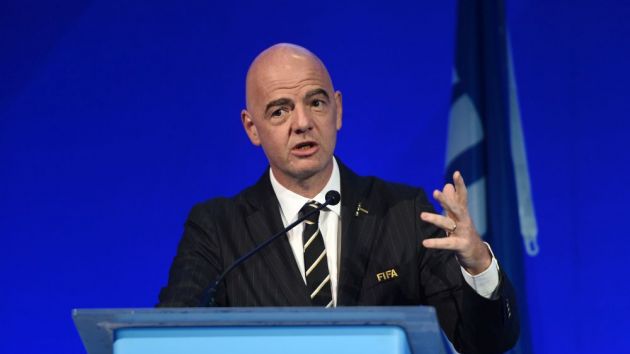Geneva: FIFA president Gianni Infantino defended his work with Saudi Arabia Friday, and dismissed calls from Norway to boycott the 2022 World Cup in Qatar over human rights concerns.
Infantino’s comments came in a first online news conference with international media in Europe since his two-day visit to Saudi Arabia in January.
Then, the leader of world soccer had his latest meeting with Mohammed bin Salman, the kingdom’s crown prince who was linked last month in a declassified U.S. Intelligence report to ordering the 2018 killing of a Saudi journalist.
“I’m the president of FIFA and as such I have to look at football and what football can do and the role football can play in society,” Infantino said on Friday when asked about having the meeting amid the allegations.
He singled out the development of women’s soccer in Saudi Arabia that was “something unthinkable a couple of years ago.”
During his visit, he praised the kingdom in a government promotional video that drew criticism from human rights activists.
Infantino visited Saudi Arabia while an accord was being signed by Gulf Cooperation Council nations toward ending regional disputes.
World Cup host Qatar was put under a diplomatic and transport boycott by regional neighbors, including Saudi Arabia and the United Arab Emirates, from 2017 until the end of last year
During the boycott, Infantino pushed for Qatar to share World Cup hosting with some neighbors as part of a tournament expansion to 48 teams.
He said in 2018 that Qatar accepting the proposal “would probably be a nice message,” but the emirate rejected it.
The political potential of the 32-team tournament kicking off in November next year is still being promoted by FIFA.
“Maybe a football event such as the World Cup can contribute a little bit to broaden our minds, to open up cultures, to make people meet with each other and move ahead in a positive way,” Infantino said Friday.
Qatar has been under pressure about its human rights policies and treatment of migrant workers since being awarded soccer’s biggest event by FIFA in 2010.
After recent reports suggested 6,500 migrant workers died in Qatar in the past decade, top-tier clubs in Norway have urged a boycott on their national soccer federation.
“I definitely don’t think that a boycott of the World Cup is the right approach of anything,” Infantino said.
Referring to the eight stadiums Qatar will use for the month-long tournament, Infantino said there had been “three worker-related fatalities since 2014” and 34 other deaths of people who were working on World Cup venues.
“Even one is tragic and we acknowledge that,” he said.
Infantino suggested soccer helped speed up progress related to wages, ability to change jobs, and working conditions for migrant labor in Qatar.
“Our position at FIFA has always been, and will always be, engagement and dialogue is the only and the best way forward to make changes happen.”
AP






































